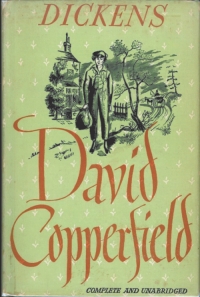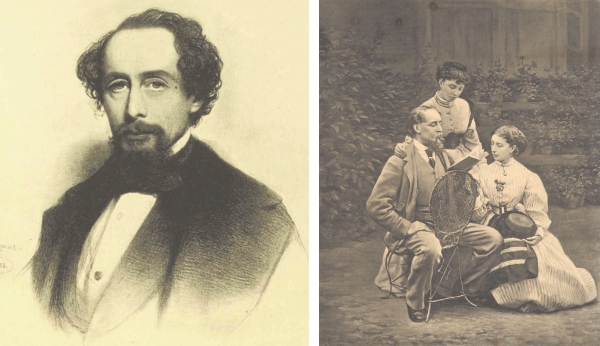| Home - Back Issues - The Team - Contact Us |
 |
| Volume 11 |Issue 09| March 02, 2012 | |
|
|
Literature Dickensian Delight Syed Maqsud Jamil 2012 is Dickens' bicentennial year. The celebrated English language author Charles John Huffman Dickens was born on 7 February 1812 in Portsmouth, Hampshire, England to Elizabeth née Barrow and John Dickens, a clerk in the Navy Pay Office. He continues to remain the delight of English-language readers because of the mastery of his prose, the sweep of his imagination, the vividness of his characters, and the tenderness of his concerns. A number of luminaries lighted up the times he lived (1812-1870) – Abraham Lincoln, Queen Victoria, Mark Twain, Leo Tolstoy, Victor Hugo, Henry James, HW Longfellow, Gustavus Flaubert, Fyodor Dostoevsky, Otto Von Bismarck et al, but to be fair to him, he was the first literary celebrity of the world. He was phenomenally endowed with versatility, boundless energy, a natural understanding of business and a lucid and mellifluous style of storytelling that endeared him to his readers.
There are few other authors whose personal life has such a large presence in their literary work. His father John Dickens had all the grandiloquence, genuine charm, innate sense of kindness and financial irresponsibility that is seen in Wilkins Micawber of David Copperfield. John and Elizabeth were comfortably placed but loved to socialize, often living beyond their means. Charles' childhood at Chatham was the memorable time of his life; he loved to read and was a voracious reader. But by the time he was ten his family landed in trouble because of the borrowing habits of his father. John landed in Marshalsea debtor's prison. All the family went with him except for Charles. He was sent off to work at Warren's shoe blacking factory to paste labels in support of the family. It weighed heavily on his mind. The trials of adversity came out in Life of Charles Dickens, a biography written by his friend John Forster, appointed by him. But the tale was already there in his autobiographical novel David Copperfield. It is mirrored in the narration of the ironhanded treatment of David by his step-father Mr Murdstone and his sister Jane Murdstone. David recalls with touching poignancy, “I know enough of the world now, to have almost lost the capacity of being much surprised by anything; but it is matter of some surprise to me, even now, that I can have been so easily thrown away at such an age… and I became, at ten years old, a little labouring hind in the service of Murdstone and Grinby.” His father John again appears in Little Dorrit as William Dorrit. It is the story of a man imprisoned for debt. The story takes the readers on a journey of discovering the psychology of confinement. And Maria Beadnell of his abortive love affair is there as Flora Finching, “left a lily” and who “had become a peony”. Dickens childhood became an experience that kept coming back in his tales of children set adrift by the adversities of life and birth. Charles is there as the 'castaway' children in his works like Oliver Twist in Oliver Twist, Little Nell in The Old Curiosity Shop, Barnaby Rudge in Barnaby Rudge, Nicholas Nickleby in Nicholas Nickleby, Florence Dombey in Dombey and Son, and poor Jo in Bleak House, Sissy Jupe in Hard Times and as Pip in Great Expectations. George Orwell paid his tributes to Dickens observing, “No one, at any rate no English writer, has written better about childhood than Dickens.” Most of the early novels of Charles Dickens carried a social agenda. He spoke of the deplorable state of laws in mid-1830s by narrating the blood curdling murder of Nancy and the phantasmagoric den of Fagin in Oliver Twist. In Nicholas Nickleby, he brought to public eye the tyrannical system of schools in Yorkshire. As he developed a greater command over his subject, his literary barbs were targeted against the evils of the 'System' and against the gross miscarriage of history. Thus, the Circumlocution Office in Little Dorrit represented the psychological persecution of life in the debtor's prison where Amy Dorrit was born. In Bleak House, there is the court case of Jarndyce & Jarndyce that draws the life out of all who enters them with the crushing coils of corruption. In A Tale of Two Cities, it is the indictment of the French Revolution's mindless bloodletting. The last paragraph is like a historic denouement: “Sydney Carton calmly took his place on the scaffold. He appeared to be quite happy, because he thought that he would be remembered by the lady he loved and have a place in her heart because of sacrifice. This sacrifice really exalted him and he felt contented with the rest he would have after the guillotine descended on him.”
Dickens was the author who brought appreciable popularity to literature, particularly to novels. The numbers of novels written at that time were not many. Printing technology was still in its early stages. Besides, novels were yet to receive cultural respectability; it was to a great degree seen as silly and discouraged. Even Jane Austen sadly observed, “…no species of composition has been so much decried.” Dickens personally deserves recognition for successfully building the link between creativity and commerce. He started as a journalist, developed as a writer, even edited newspapers and journals, mastered the trade of publication and most of all attained phenomenal popularity as a novelist and as a writer. Charles Dickens was a great storyteller. He had an absorbing style of telling his story to the readers that built an instant rapport. Many often find the style of a ventriloquist in him. The mastery of his prose aids his tales to flow on with an easy and captivating grace; as if he is there in the midst of it. His autobiographical work David Copperfield unfolds with angelic innocence: “I record that I was born (as I have been informed and believe) on a Friday, at twelve o'clock at night. It was remarked that the clock began to strike, and I began to cry, simultaneously.” The characters he created had a broad range, from tragic to comic – characters that readers would love, and loathe. His characters come with such natural spontaneity, full of pathos touching the hearts of the readers to the core, like David, Poor Jo of Bleak House and Paul Dombey in Dombey and Son, and comic characters like Wilkins Micawber of David Copperfield, Mrs. Sarah Gamp and Seth Peckniff of Martin Chuzzlewit. Even Dickens was not without his crop of critics. Many of the notables have found his writing laboured; devoid of literary essence that transcends the time according to the modern standard. His contemporary Henry James made the blunt remark, “He has added nothing to our understanding of human character.” The American writer Mark Twain expressed his disappointment, “I must fain confess that with the years I have lost much of my youthful admiration for Dickens.” Readers in general seek delight in literature. By that definition reading Dickens is a delightful experience. The popularity of Dickens continues through the ages and it will in the times to come. Dickens is not a difficult read. The discovery of the joy of reading literature always has Dickens among the top. It is what the heart seeks in any age and in any time where English is read.
Copyright
(R) thedailystar.net 2012 |
||||

